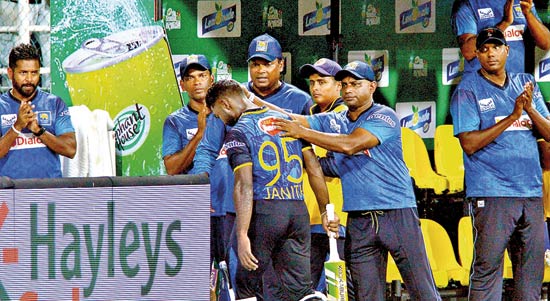SLC seeks foreign coaches to bridge “knowledge gap”
Sri Lanka Cricket (SLC) is once again turning to foreign expertise in an attempt to “raise” the standards of the national team. Following a disappointing 2-1 T20I series defeat to Bangladesh, the board has advertised for new batting, fielding, and spin bowling coaches, effectively replacing Thilina Kandamby, Upul Chandana, and Piyal Wijetunga, all former Sri Lanka internationals. Sri Lanka’s next international assignment is in Zimbabwe, where they will play a six-match white-ball series before heading to Dubai for the Asia Cup.
This is a significant shift from the current practice. The current coaching setup, under head coach Sanath Jayasuriya, has been all local. While the team has performed reasonably well in Test and ODI formats under this configuration, results in T20 cricket have been underwhelming, prompting a strategic rethink ahead of the 2026 ICC T20 World Cup.

The local coaching staff, headed by Sanath Jayasuriya, has done a tremendous job to elevate standards
One of the central arguments in favour of foreign coaches is their perceived expertise and exposure to more advanced coaching methods. According to SLC CEO Ashley de Silva, the decision is not a reflection on the competence of local coaches but rather an attempt to “bridge the knowledge gap”.
“When we work with foreign experts, we realise the knowledge gap that exists,” de Silva stated.
“The local coaches have been working really hard and we appreciate that, but we feel there’s a gap and we are trying to bridge that to help them and the team.”
Foreign coaches are often seen as more professional and fair, as they are less involved in local politics and biases. Their experience in various international setups and global franchise leagues lends them a broader tactical and technical perspective.
Moreover, coaching today is no longer viewed as a mere extension of playing experience. As de Silva aptly pointed out, “Just because you have played the game at the highest level, you will not be a good coach. There are many traits that come with it like communication, knowledge, analytical skills, etc.”
The job advertisement issued by SLC specifies a proven coaching track record, first-class playing experience, and familiarity with modern cricket technology, signalling a desire for more than just high-profile names.
However, the all-local coaching experiment has not been without merit. Under Jayasuriya’s leadership, the national side has shown tangible progress in the longer formats. The team has won five out of six series played during the last 12 months and registered notable Test victories, highlighting the contributions made by the local support staff.
Over the past 18 months, SLC has saved millions of rupees by employing local coaches. While local staff typically earn between Rs. 400,000 and 1.2 million a month, a single foreign coach could cost the board at least US$10,000 monthly, a huge expenditure in the current financial climate.
Beyond cost and competence, local coaches offer something foreign counterparts may lack, a deep-rooted understanding of Sri Lankan cricketing culture, language, and player psychology. They often build stronger, more empathetic relationships with players. Under the guidance of fielding coach Upul Chandana, for instance, fielding standards saw visible improvement, though, as de Silva conceded, consistency remained a challenge.
Foreign coaches may provide short-term tactical benefits, particularly in tournament preparation, but it is local coaches who are more likely to remain committed to Sri Lankan cricket in the long haul. Therefore, SLC must define clear performance benchmarks and accountability mechanisms for both local and foreign coaches alike. Foreign coaches often leave without much questioning because their good reputations protect them from criticism.
On the other hand, local coaches are often criticised quickly after a few poor results, without considering the bigger problems they have to deal with. Sri Lanka’s coaching future needs to follow a more balanced approach, one that welcomes international expertise but also focuses on training, keeping, and respecting local coaches.


